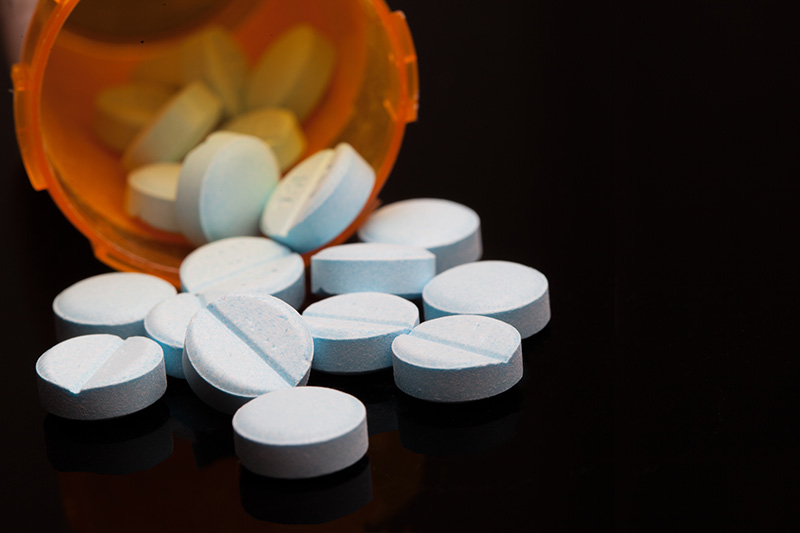Opiate Addiction
Opiates are drugs that are usually prescribed for extreme pain that lasts only a few days due to injury or surgery. However, prescription opiates can also be purchased on the black market. Not all opiates are prescription based, for example, heroin is an illicit opiate.
Opiates carry a high risk of dependency and abuse due to the impact they have on dopamine, the ‘feel good’ neurotransmitter in the brain. Opiates tend to work for a few hours at a time to manage pain, and therefore carry a higher risk of abuse potential.
The following guide covers what opiate addiction is, the signs & symptoms as well as the risk factors associated with opiate use. If you or someone you love is struggling with opiate use, this guide will provide clarity, so that you can decide to seek treatment for opiate addiction when the time is right.
What is Opiate Addiction (Opiate Use Disorder)?
Opiate Addiction or Opiate Use Disorder is the chronic use of Opiates that supersedes other areas of your life, both socially and professionally, despite the negative consequences.
If you are someone struggling with opiate addiction you most likely:
- Can’t stop taking opiates
- Have difficulty with talking (slur your words) due to opiate misuse
- Often feel anxious, agitated, moody, depressed or have lost interest in things you used to enjoy
- Prioritise buying opiates illegally via online “pharmacies” or by misleading GP’s into thinking you need prescribed opiates
- Find yourself having to lie, hide or steal in order to get your opiate of choice, this can cause you to neglect your appearance and cause difficulties with work and at home.

Opiate addiction vs. abuse
As of 2019 (WebMD Medical Reference) between 8% and 12% of people who take opiates develop an Opiate Use Disorder (OUD).
Opiate abuse is defined as using opiates outside of their intended use – either by taking more than the prescribed dose to feel good or by buying opiates illegally for a party or festival. Typically, those that abuse opiates know when to stop, and do not feel the need to continue using opiates during important life situations or work commitments.
Opiate addiction is when you can’t stop taking opiates despite financial, emotional or physical damage. Addiction is marked by compulsive drug seeking behaviour in the face of serious negative consequences.
While there is a distinction between abuse and addiction, the lines become more blurred the longer you abuse opiates. Therefore, if you are someone who is using opiates more frequently, you are increasing your risks of developing opiate addiction and dependence.
The current Drug Laws in the UK carry maximum penalties under the Misuse of Drugs Act that could include life in prison. The Misuse of Drugs Act (MDA 1971) divides drugs into three classes, all three contain forms of Opioids.
Common Opiate Addictions
Opiates are a class of drug that includes both prescription pain medicines and illegal drugs such as heroin, all of which can lead to substance abuse and dependency, below we discuss a few of the different types of opiates that are known for their abuse potential.
Fentanyl
A powerful opiate used to relieve severe ongoing pain (i.e Cancer). Fentanyl is applied normally as a patch to your skin and only replaced every 72hrs. Illegally, fentanyl can be injected or taken orally with high risk of overdose.
Side effects include shortness of breath, slow heart rate, and anxiety.
Fentanyl was developed in 1960 as an alternative to the Morphine – Oxygen Anaesthesia being used at the time and is 100 times stronger than Heroin, its recreational use in the UK has increased dramatically over the past 10 years.
Heroin (Diamorphine)
Common street names are horse, smack, junk, and brown.
Heroin (diacetylmorphine) is a form of Morphine developed in 1898 and proved more effective for pain management.
Heroin reaches your brain very quickly regardless of how you choose to take it (smoking, snorting or intravenously) and provides you with a rush of euphoria, followed by several hours of a dreamlike state. Heroin makes the individual feel numb and cushioned.
Heroin is a powerful pain blocker and slows your heart rate and breathing. Substance abuse can happen very quickly for some users.
Hydrocodone (Vicodin or Zohydro ER)
Hydrocodone is one of the most commonly-prescribed opiates worldwide, the use of which (whilst pain relieving) causes feelings of euphoria.
Although Hydrocodone was initially developed in the 1920’s to make Codeine easier on the stomach and as an alternative, “less addictive” painkiller, hydrocodone is still a substance of abuse within the UK.
Codeine
Codeine is a weaker pain reliever and cough suppressant. A small amount of codeine is converted into morphine in the body, increasing pain tolerance and decreasing discomfort.
Codeine is available in both prescription and over the counter brands (codeine and paracetamol).
Although Codeine is considered a “safer” alternative to other opiates, the risk of abuse and addiction is still high owing to affects on the brain (Dopamine).

The dangers of Opiate Substitutes
When individuals facing a heroin or opiate addiction seek treatment, substitute opiates such as methadone are used to support withdrawal. Unfortunately, these substitutions carry a high risk of mortality in individuals with opioid dependence during and after treatment (PubMed). This is owed to greater use of substituted substances during follow-up treatment. It simply maintains the cycle of dependence as it fails to address the underlying issues for addiction.
How Opiate Addiction Develops
Opiate dependence, addiction and increased tolerance are all associated with brain changes due to chronic opiate usage.
Whilst these brain changes are an underlying cause, there are other contributing factors to becoming dependent or addicted to Opiates:
Repeat exposure
Chronic usage of prescription Opiates for long term pain management in as little as 3 months can facilitate the dependency as well as building a tolerance within your body to the pain relieving effects of the medication.
Repeated exposure will make your brain feel normal while taking the drug and abnormal when it has worn off.
The fear of withdrawal or the return of pain also contributes to long term use. Opiates evoke feelings of pleasure, and in the absence of pain this can motivate the repeated use of the drug.
Trauma & mental health
Psychological trauma typically caused by events that happened at any time in your life resulting in high stress situations.
Consequences of trauma, such as PTSD (Post Traumatic Stress Disorder) is long term and often you will need to work through the trauma with a professional.
Experiencing childhood trauma increases the risk of PTSD, depression and opiate abuse, many people turn to Opiates to help numb the psychological pain, to stay calm or even feel empowered.
Before the psychological trauma can be treated, the opiate addiction must be identified and treated.
A family history of Opiate Use
Whilst addiction can happen to anyone regardless of age, gender, religion, class or any other factor, if your family has a history of addiction, you are at increased risk of developing addiction.
Friends form part of our familial circle and can also influence your susceptibility especially if you are already suffering from self doubt or low self esteem.
Signs & Symptoms of Opiate Addiction
Whilst a medical professional can diagnose addiction, it is usually self diagnosable and evident to family and friends.
You may experience:
- Uncontrollable cravings
- Sacrifice personal relationships and finances in pursuit of purchase
- Sweating
- Euphoria or feelings of discontent
- Chronic constipation
- Small (pin prick) pupils
- Nausea
- Reduced libido
- Heightened sensitivity to pain
- Shallow breathing
- Slurred speech
Diagnosing Opiate Addiction
Adequate assessment is needed in determining Opiate addiction and the recommended treatment plan by trained professionals.
The CAGE Questionnaire is a simple screening questionnaire to identify possible addictions to alcohol and has been adapted to include drugs (CAGE-AID)
Questions you will be asked are as follows:
- 1.Have you felt you ought to cut down on your drinking or drug use?
- 2.Have people annoyed you by criticizing your drinking or drug use?
- 3.Have you felt bad or guilty about your drinking or drug use?
- 4.Have you ever had a drink or used drugs first thing in the morning to steady your nerves or to get rid of a hangover (eye-opener)?
A link for professionals to use is https://patient.info/doctor/cage-questionnaire
The opioid Risk Tool (https://www.drugabuse.gov/sites/default/files/opioidrisktool.pdf) is a more complex assessment that calculates your risk of having an Opiate Use Disorder.

The Dangers of Opiate Addiction
Opiate addiction can cause long term effects and changes within your brain, Hyperalgesia which is an increased sensitivity to pain.
Other physical dangers are:
- Gastrointestinal Effects
- RespiratorySystem Effects & Depression
- Cardiovascular System Effects
- Central Nervous System Effects
- Musculoskeletal System Effects
- Endocrine System Effects
- Immune System Effects
Addiction can also cause a breakdown in social and family relationships.
Opiate use in pregnancy
Opiates cross the placenta and can cause dependency in neonates resulting in Neonatal Abstinence Syndrome at birth.
Fetal abnormalities are at increased risk especially if opiates are consumed in the first 2 months of pregnancy.
The Impact of Opiate Addiction on Communities
The effects of opiate addiction can lead to a breakdown in communication, impairment of emotional and physical intimacy, familial conflict, even domestic abuse.
Within the community, Opiate Use Disorder has grave consequences to our social systems, crime rates rise, rapid consumption of limited public funds and increased medical care required including hospitalisations.
In 2020 according to the findings on NHS Digital there were:
- 7,027 hospital admissions for drug-related mental and behavioural disorders
5% lower than 2018/19 (7,376), but 21% higher than 2009/10 (5,809) - 16,994 hospital admissions for poisoning by drug misuse
6% lower than 2018/19 (18,053), but 9% higher than 2012/13 (15,580) - 99,782 admissions with a primary or secondary diagnosis of drug-related mental and behavioural disorders
3% higher than 2018/19, when there were 96,705 admissions. - Admissions were around 5 times more likely in the most deprived areas, compared to the least deprived areas.
Opiate Use Disorders and employment
Opiate Use Disorders can affect your work environment, due to the effect opiates have on the brain, you will have impaired concentration and judgement that could lead to workplace injuries. It would be very difficult to maintain a job while using opiates at work, owing to their strong effects on the body.
Is Opiate Addiction a Disease?
Opiate addiction as for many years was thought to be a choice (Gene Heyman’s Addiction: A disorder of choice).
Further studies in recent years have found that Addiction is a disease that affects your brain, behaviour and requires treatment just like any other disease, the earlier treatment is given the better the chance of recovery.
Addiction as a disease isn’t simply caught, there are mitigating circumstances that influence your odds of developing addiction.
- Family History – genes account for at least half your odds of becoming addicted
- Drug Use in Childhood – Opiates introduced whilst a child’s brain is growing can change the growth and increase addiction as they get older
- Mental Disorders – Drug seeking to escape depression, stress, anxiety
- Troubled Relationships – Breakdown in family structure, lack of support.
Addictive behaviours are primarily psychological in nature, as mentioned earlier the Opioid Risk Tool factors in family history of substance use, childhood sexual abuse, depression, shizophrenia as well as age to determine your risk.

Getting Help for Opiate Addiction
You can start with your GP who may refer you to one of the outpatient services offered by the NHS or notable charities. Alternatively, private addiction treatment and rehab options are available throughout the UK.
You can also speak to one of our addiction specialists who will be happy to talk you through the different options available to you.
The Adfam website is very useful and has a list of different organisations that you can contact.
Due to the nature of opiates we strongly recommend that you speak to a medical professional before attempting an opiate detox. This could be your own GP or a member of our trained staff.
References
- https://www.drugwise.org.uk/what-are-the-uk-drug-laws/
- https://www.webmd.com/pain-management/opioids-opiates-explained
- https://www.webmd.com/mental-health/addiction/painkillers-and-addiction-narcotic-abuse
- https://www.ncbi.nlm.nih.gov/books/NBK553166/
- https://pubmed.ncbi.nlm.nih.gov/1517629/
- https://pubmed.ncbi.nlm.nih.gov/11862675/
- https://www.webmd.com/connect-to-care/addiction-treatment-recovery/prescription/why-is-hydrocodone-addictive
- https://www.drugabuse.gov/publications/drugfacts/heroin
- https://academic.oup.com/qjmed/article/110/9/559/3098674
- https://www.webmd.com/mental-health/addiction/what-is-methadone#1.
- https://www.ncbi.nlm.nih.gov/pmc/articles/PMC2851054/
- https://dualdiagnosis.org/psychological-trauma-drug-addiction/
- https://www.ncbi.nlm.nih.gov/pmc/articles/PMC2797097/
- https://patient.info/doctor/cage-questionnaire
- https://www.drugabuse.gov/sites/default/files/opioidrisktool.pdf
- https://www.ncbi.nlm.nih.gov/pmc/articles/PMC3466038/
- https://www.ncbi.nlm.nih.gov/pmc/articles/PMC3725219/
- https://digital.nhs.uk/data-and-information/publications/statistical/statistics-on-drug-misuse/2020/part-1-hospital-admissions-related-to-drug-misuse
- https://digital.nhs.uk/data-and-information/publications/statistical/statistics-on-drug-misuse/2020
- https://www.unison.org.uk/get-help/knowledge/health-and-safety/alcohol-drugs-and-substance-abuse/
- https://www.webmd.com/mental-health/addiction/drug-abuse-addiction#1
- https://www.webmd.com/mental-health/addiction/drug-abuse-addiction#2
- https://adfam.org.uk/help-for-families/useful-organisations
- https://www.nhs.uk/live-well/healthy-body/drug-addiction-getting-help/
